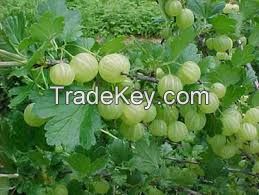
FOB Price
أحصل على آخر سعر28.5 ~ 120.2 / Kilogram
|Minimum Order
Place of Origin:
-
Price for Minimum Order:
Minimum Order Quantity:
50 Kilogram
Packaging Detail:
25Kg HDPE drum with single PE Liner
Delivery Time:
7 ~ 10 Days
Supplying Ability:
50 Ton per Month
Payment Type:
T/T, Western Union, Money Gram
South Africa
الشخص الذي يمكن الاتصال به Mr. Diseko
Banfield, Johannesburg, Gauteng
Amla Extract, Emblica Officinalis Extract,
Amla Phyllanthus emblica *5% Tannins
Latin Name and Speciation: Emblica officinalis Gaertn.
Origin : India.
Habit : A deciduous tree of small to medium size up to 5.5 meter
Family: Euphorbiaceae
Common Names:
Amalik (Sanskrit), amla (Hindi), (German) emblic, Indian gooseberry (English), mirabolano emblico (Italian) amara
(Japanese), Phyllanthe emblic (French), nellikai (Malaysian), makarm pom (Thai)
Emblica officinalis, commonly referred to as Indian gooseberry or amla, is a deciduous tree native to India and the Middle East. Amla has been used medicinally for thousands of years.
Amla extracts offers the best possible effects that can be achieved from amla. Amla extracts are the purest from of Amla, free from any kind of adultration and impurities. The bio-availability is the highest in this form of extraction of Amla. It's action is more efficient at smaller dose than any other forms of Amla. Its results are instant and very effective. Amla extracts are best for the preparation and manufacturing of many theraputic capsules, tablets as well cosmetic sampoos, oils etc.
Chemistry
This product is soluble in water, pale green to deep brown free flowing powder and contains more than *5% polyphenols.
Although the leaves contain medicinally active compounds, most supplements today are derived from the fruit of the amla plant. The fruit is a rich source of vitamin C and it contains a variety of phytochemicals including ellagic acid, gallic acid, quercetin and flavonoids. Phytochemicals are compounds found naturally in plants that help to prevent and treat disease in humans. "Natural Medicines Comprehensive Database" states that amla demonstrates antioxidant, anti-inflammatory, anti-ulcer, immune-boosting and antimicrobial properties.
Composition / Actives:
Fruit: Ellagitannins (chebulagic acid, phyllanemblinin C, geraniin); hydrolysable tannins (emblicanin A and B),
pedunculagin, punigluconin, gallic acid (5%), ellagic acid, tannin (*8%) vitamin C (3.*5% w/w by HPLC in extract of
fresh fruit), and alkaloids (phyllanthine, phyllantidine). Leaves: Tannin (*2%), alkaloids (phyllanthine, phyllantidine),
and ellagic, gallic, chebulinic, chebulic, chebulagic, and amlaic acid (gallotannin).